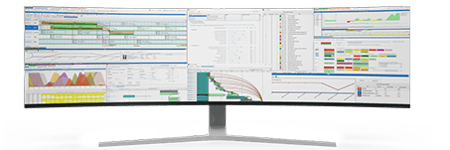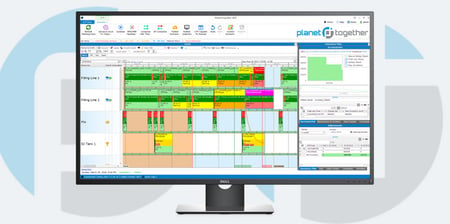Adoption of Predictive Maintenance
Production schedulers play a critical role in ensuring that operations run smoothly, deadlines are met, and production targets are achieved in pharmaceutical manufacturing. As the industry faces increasing demands for efficiency, precision, and compliance, predictive maintenance (PdM) is emerging as a game-changing technology. By leveraging data-driven insights to predict equipment failures before they occur, predictive maintenance can reduce unplanned downtime, optimize asset utilization, and enhance overall operational performance.
When combined with advanced scheduling systems like PlanetTogether and enterprise resource planning (ERP) systems such as SAP, Oracle, Microsoft Dynamics, Kinaxis, or Aveva, the power of predictive maintenance is further amplified. This integration not only streamlines production scheduling but also drives cost savings, improves product quality, and ensures compliance with stringent regulations.
In this blog, we will explore the adoption of predictive maintenance in pharmaceutical manufacturing, its impact on production scheduling, and how the integration of PlanetTogether with ERP systems can transform operations for production schedulers in this highly regulated industry.

The Importance of Predictive Maintenance in Pharmaceutical Manufacturing
Pharmaceutical manufacturing facilities are capital-intensive environments that rely heavily on complex machinery and equipment to produce life-saving drugs. Any unplanned equipment downtime can have significant repercussions, including production delays, costly repairs, and regulatory non-compliance. These challenges are compounded by the fact that pharmaceutical manufacturing must adhere to strict quality standards set by regulatory bodies such as the U.S. Food and Drug Administration (FDA) and the European Medicines Agency (EMA).
Traditional maintenance strategies, such as reactive maintenance (repairing equipment after it breaks) and preventive maintenance (regularly scheduled maintenance regardless of equipment condition), can no longer meet the demands of modern pharmaceutical manufacturing. Reactive maintenance often leads to unplanned downtime, while preventive maintenance may result in unnecessary maintenance actions and increased costs.
Predictive maintenance, on the other hand, offers a proactive approach by using advanced analytics, machine learning, and IoT (Internet of Things) sensors to monitor equipment conditions in real-time. This allows manufacturers to predict when a piece of equipment is likely to fail and take corrective action before a breakdown occurs. By adopting predictive maintenance, pharmaceutical manufacturers can:
Reduce Unplanned Downtime: Predictive maintenance helps identify potential failures early, allowing production schedulers to plan maintenance activities during scheduled downtime rather than in the middle of critical production runs.
Optimize Maintenance Schedules: PdM enables maintenance to be performed only when necessary, reducing the frequency of unnecessary maintenance actions and extending the lifespan of equipment.
Ensure Regulatory Compliance: Predictive maintenance systems can automatically track and document maintenance activities, ensuring that equipment remains in compliance with regulatory requirements.
Improve Product Quality: By maintaining equipment in optimal condition, manufacturers can reduce the risk of defects, contamination, or variations in product quality.
Lower Maintenance Costs: Predictive maintenance reduces the need for emergency repairs and minimizes the use of spare parts, lowering overall maintenance expenses.


The Role of PlanetTogether in Optimizing Production Schedules
As a production scheduler in a pharmaceutical manufacturing facility, managing the delicate balance between production efficiency and equipment availability can be a daunting task. This is where advanced production scheduling software like PlanetTogether comes into play. PlanetTogether is designed to optimize production scheduling by considering multiple factors such as equipment availability, labor resources, and material constraints.
By integrating predictive maintenance data into PlanetTogether’s scheduling algorithms, production schedulers can make more informed decisions about when to schedule maintenance activities. This leads to a more efficient use of equipment and resources, as well as reduced downtime.
Some key benefits of using PlanetTogether in conjunction with predictive maintenance include:
Dynamic Scheduling: PlanetTogether’s dynamic scheduling capabilities allow production schedulers to adjust production plans in real-time based on the latest predictive maintenance data. If an equipment failure is predicted, the system can automatically adjust the production schedule to accommodate maintenance activities, minimizing disruption to the overall production flow.
Improved Resource Allocation: With predictive maintenance data integrated into PlanetTogether, schedulers can allocate resources more effectively. For example, if a critical piece of equipment is predicted to fail, the scheduler can shift production to alternative equipment or lines to avoid delays.
Enhanced Visibility: PlanetTogether provides a comprehensive view of the entire production process, including equipment status and maintenance schedules. This visibility enables production schedulers to proactively address potential bottlenecks and ensure that production targets are met.

Integration of PlanetTogether with ERP Systems (SAP, Oracle, Microsoft, Kinaxis, Aveva)
To fully realize the potential of predictive maintenance in pharmaceutical manufacturing, it is essential to integrate scheduling systems like PlanetTogether with ERP systems such as SAP, Oracle, Microsoft Dynamics, Kinaxis, or Aveva. ERP systems manage critical business functions such as inventory management, procurement, financials, and compliance, while PlanetTogether focuses on optimizing production schedules. By integrating these systems, manufacturers can achieve a holistic approach to production planning and maintenance management.
How Integration Works
The integration of PlanetTogether with ERP systems allows data to flow seamlessly between the two platforms. Predictive maintenance data captured by IoT sensors and processed by predictive analytics tools can be fed into the ERP system, which then communicates this information to PlanetTogether. This enables production schedulers to see the current and future status of equipment, and adjust schedules accordingly.
For example, if an ERP system like SAP detects that a critical piece of equipment is predicted to fail within the next 48 hours, it can send an alert to PlanetTogether. The production scheduler can then use this information to reallocate production tasks, schedule maintenance, and minimize the impact on production timelines.
Benefits of Integration for Production Schedulers
Real-Time Data Sharing: Integration between PlanetTogether and ERP systems enables real-time sharing of predictive maintenance data. This ensures that production schedulers always have the most up-to-date information about equipment status and can make timely decisions.
Enhanced Decision-Making: With predictive maintenance data integrated into both the ERP system and PlanetTogether, production schedulers can make more informed decisions about when to schedule maintenance activities, avoiding disruptions to production.
Automated Workflows: Integration automates many of the manual processes associated with production scheduling and maintenance planning. For example, when predictive maintenance data indicates that a piece of equipment is nearing failure, the ERP system can automatically generate a work order for maintenance, while PlanetTogether adjusts the production schedule to accommodate the necessary downtime.
Improved Compliance and Reporting: Pharmaceutical manufacturers must maintain detailed records of all maintenance activities for regulatory purposes. By integrating predictive maintenance data with ERP systems, manufacturers can automatically generate the documentation required for audits and regulatory inspections, ensuring compliance with industry standards.
Optimized Inventory Management: Predictive maintenance helps manufacturers plan for spare parts and maintenance materials more effectively. By integrating ERP systems like Oracle or SAP, which manage inventory and procurement, with PlanetTogether, production schedulers can ensure that necessary spare parts are available when needed, reducing the risk of production delays due to missing materials.

Overcoming Challenges in Predictive Maintenance Adoption
While the benefits of predictive maintenance are clear, adopting this approach in pharmaceutical manufacturing is not without its challenges. Some of the key hurdles include:
Data Integration: Integrating predictive maintenance data with existing ERP and scheduling systems can be complex, especially in legacy environments. However, with the right integration tools and strategies, manufacturers can overcome this challenge and create a seamless flow of data between systems.
Change Management: Adopting predictive maintenance requires a shift in mindset from reactive to proactive maintenance strategies. Production schedulers, maintenance teams, and other stakeholders must be trained to understand and trust the data provided by predictive maintenance systems.
Upfront Investment: Implementing predictive maintenance requires investment in IoT sensors, data analytics tools, and integration technologies. However, the long-term cost savings and efficiency improvements often outweigh the initial investment.
The adoption of predictive maintenance in pharmaceutical manufacturing has the potential to revolutionize production scheduling by reducing unplanned downtime, optimizing maintenance schedules, and ensuring regulatory compliance. For production schedulers, the integration of PlanetTogether with ERP systems such as SAP, Oracle, Microsoft, Kinaxis, or Aveva offers a powerful toolset for managing production schedules in real-time, based on predictive maintenance insights.
By embracing predictive maintenance and leveraging advanced scheduling and ERP integration, pharmaceutical manufacturers can enhance operational efficiency, reduce costs, and improve product quality—all while maintaining compliance with stringent industry regulations. For production schedulers, this shift represents an opportunity to move from reactive, firefighting modes of operation to a more strategic, data-driven approach that drives continuous improvement across the manufacturing process.
Are you ready to take your manufacturing operations to the next level? Contact us today to learn more about how PlanetTogether can help you achieve your goals and drive success in your industry.